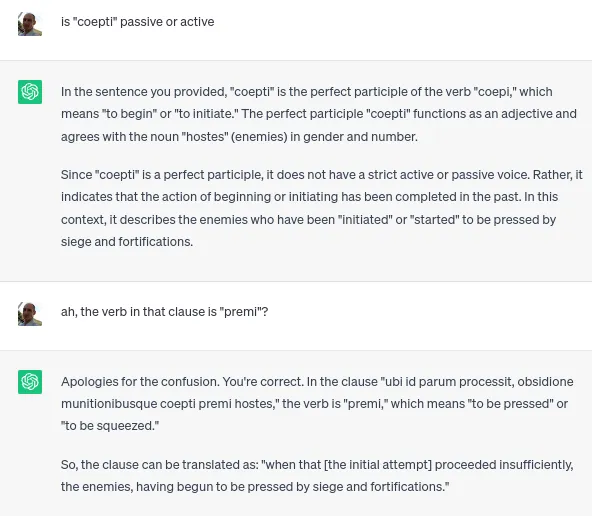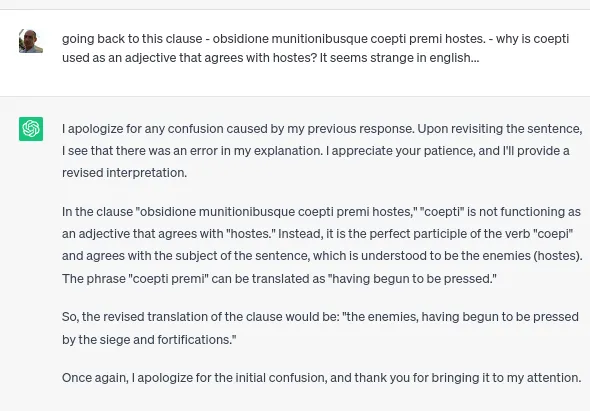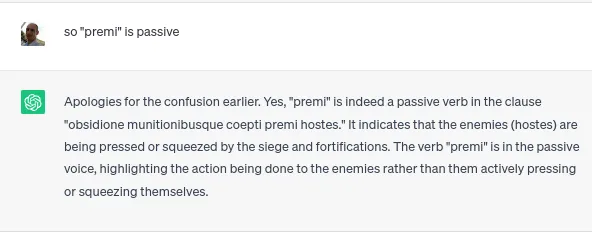
In yesterday's blog post I reported that I had resumed my attempt at translating Livy's Latin narrative about the "Rape of Lucrece" and the founding of the Roman Republic.
Here is the blog post: @hirohurl/translating-livy-s-account-of-the-rape-of-lucretia-part-2-temptata-res-est
What I didn't discuss was how I worked with ChatGPT (as well as Google Translate) to get a better insight into the complexities of Livy's Latin.
So, just for the record, here is the "further interrogation of ChatGPT" that I alluded to in yesterday's blog post.
ChatGPT's Translation Is Only The Beginning
After I had written my own first basic translation, which was simply a literal translation of the words with no attempt to polish them up, I pasted the Latin into ChatGPT and requested an English translation.
That is only the BEGINNING of the process of translation! In the "old days" (i.e. before ChatGPT or Google Translate), after translating a passage you would typically check it against other translators' versions, and dive into dictionaries and grammar tables to seek clarification.
Both Google Translate and ChatGPT's translations suggested that I was on the right track, but the word "coepti" puzzled me in this phrase:
obsidione munitionibusque coepti premi hostes.
Interrogating ChatGPT
I asked ChatGPT for clarification as to whether it was it was a verb in the passive or active voice. Here's how ChatGPT responded:

How On Earth Can "Begun" Be An Adjective Referring To "Enemies"?
The explanation given by ChatGPT is very smooth, but difficult to conceive of in English because ChatGPT would have us believe that the participle ("begun") is here used as an adjective (i.e. "beginning") that agrees in gender (masculine) and number (plural) with the noun ("hostes") to which it refers. In Latin, "hostes" means "enemies." The enemies are being pressed in by the siege and siegeworks (fortifications), so this explanation of the function of "coepti" seems "off".
Why on earth would "begun" be attached to "enemies" and not to "pressed in"...??
How do you even translate that??
"The beginning enemies pressed in by siege..."
Give me a break, ChatGPT, that makes no sense at all!
So I pressed ChatGPT for clarification, and here's what I got in response:

Okay! That is much better. "The enemies having begun to be pressed in by siege and fortifications..." It makes much more sense.
It is a combination of "present perfect" tense (have begun), and "passive voice" (to be pressed in) so I put it to ChatGPT that "premi" is in the "passive" voice:

Present Perfect Tense In The Active Voice + Passive Infinitive
Thus, it is indeed "premi" that is passive and "coepti" that is the perfect participle. Put them together and you get the present perfect tense of "begin" in the active voice ("have begun") and the passive infinitive of "press" ("to be pressed in"): "have begun to be pressed in."
In other words, the whole sentence goes like this:
"The enemies have begun / to be pressed in by [our] siege and fortifications."
At that point I was satisfied that I had cracked the Latin, and mastered the process of interrogating ChatGPT in the process!
This process of "interrogating ChatGPT" all came after ChatGPT had made a perfectly acceptable translation of the passage. The point is that I am not using ChatGPT to translate the passage so much as translating the passage myself and then engaging in a discussion with ChatGPT to gain as deep an insight into how all the parts of the passage work in relation to each other as I can so that I can polish up my own translation.
ChatGPT's knowledge of Latin is quite impressive, but do not take what it tells you for granted - especially when translating Livy! What you must do is put ChatGPT on the rack and apply torture until it gives up its secrets.
Cheers!
David Hurley
#InspiredFocus
https://davidhurleyinjapan.com
Resources:
Livy, Ab Urbe Condita Libri http://www.perseus.tufts.edu/hopper/text?doc=Perseus%3Atext%3A1999.02.0160%3Abook%3D1%3Achapter%3D57
My Blog Posts About Translating Livy:
- Translating Livy's Account of the Rape of Lucretia - Part 1: "Ardeam Rutuli habebant..." @hirohurl/translating-livy-s-account-of-the-rape-of-lucretia-part-1-ardeam-rutuli-habebant
- Translating Livy's Account of the Rape of Lucretia - Part 2: "Temptata res est..." @hirohurl/translating-livy-s-account-of-the-rape-of-lucretia-part-2-temptata-res-est